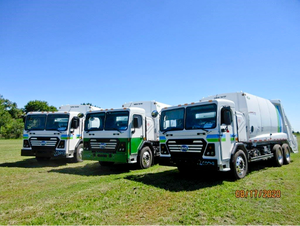RECYCLING: Siberian City Seeks MSW Advice In Tennessee
October 1, 1997
Jan Hollingsworth
What does Chattanooga, Tenn., a mid-size southern city, have in common with Nizhnii Tagil, located in the Ural Mountains of southern Siberia?
They are Sister Cities and soon may use similar methods to process recyclables.
Since May 1992, the city of Chattanooga has operated a dual blue bag curbside recycling program serving 55,000 households. Collected materials are sent to the Orange Grove Recycling Center, a regional materials recovery facility (MRF) located in the city. The recycling center is unique among MRFs in that 110 mentally-retarded and developmentally-disabled adults comprise the bulk of the workforce, processing 1.2 million pounds of recyclables each month.
In fall 1996, four city officials from Nizhnii Tagil visited Chattanooga as delegates for the Sister Cities Program. While in the area, they toured the Orange Grove MRF and found it to be a viable model for their own on-the-drawing-board recycling strategy. As a result, Orange Grove Recycling Coordinator Michael Brewer and board member Richard Burke were invited to Nizhnii Tagil to share information for a comprehensive solid waste management plan for the city.
"Curbside recycling and a regional MRF were high on city officials priority list," says Brewer, who, along with Burke, was asked to provide the city with a feasibility study on these topics. "They also were interested in using mentally-retarded individuals as the MRF's primary workforce."
In many ways, Nizhnii Tagil bears a striking resemblance to the Chattanooga of yesteryear. Both cities have strong manufacturing backgrounds with steel as a historic industry. Not surprisingly, Nizhnii Tagil suffers from widespread water and air pollution, a flashback to Chattanooga's tale of environmental woe in the late 1970s when it was dubbed "the United States' most polluted mid-size city."
Currently, Nizhnii Tagil's methods of dealing with municipal solid waste (MSW) are both progressive and antiquated, an understandable by-product of the enormous socioeconomic and political changes dynamically shaping the former Soviet Union.
For example, within the city, no recycling program exists, and the 50,000 tons of solid waste produced monthly is left in open dumps. Interestingly, however, garbage collection is automated, using trucks typical of a fleet found in many U.S. cities. Also progressive are the vocational opportunities offered for mentally-retarded and mentally-ill citizens.
Originally, Nizhnii Tagil officials planned to purchase a solid waste compactor which would not have allowed for removal and sorting of the city's recyclable material.
Now, however, they have reconsidered and are awaiting Brewer and Burke's recommendation which will include:*MSW collection methods;
* recyclables processing and marketing avenues;
* a MRF design using mentally-retarded individuals; and
* a solid waste public education program.
As a means of creating a sustainable community, the new solid waste management strategy will use resources and Nizhnii Tagil citizens in all stages of development.
The Orange Grove Recycling Center is part of the Orange Grove Center, a not-for-profit organization established in 1953 as a school for mentally-retarded children. The recycling center serves as a vocational training site where adults with disabilities gain skills to give them a competitive edge for full-time employment.
You May Also Like


